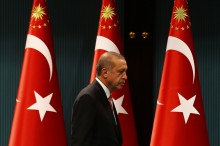There was a mass rally “Democracy and Martyrs” in Istanbul last Sunday, organized by the Turkish authorities. According to Reuters, the square that could accommodate at least one million people was full; every entrance to the place was crowded as well. The rally participants carried Turkish flags, banners, and slogans such as: “Erdogan, you have been sent to us by God” and “Tell us to die for you, and we’ll do that.” The meeting began with the national anthem and readings from the Koran. There was an area designated for special guests – relatives of those killed during the failed coup attempt on July 15. In his speech, President Recep Tayyip Erdogan promised to reinstate the death penalty in the country. “If the people want the death penalty, the parties will execute their will,” said Erdogan, as quoted by AFP. These Erdogan’s words came as a response to rally participants shouting “death penalty.”
Another event, no less important for the region, is going to happen today, in St. Petersburg: the leaders of Turkey and Russia will have a meeting. In an interview with TASS on the eve of his visit to Russia, Erdogan said: “It will be a historic visit, a new beginning. The talks with my friend Vladimir, I believe, will open a new page in bilateral relations. Our countries have much to do together.”
The Day asked Ihor Semyvolos, Executive Director at Center for Middle East Studies, to comment on whether the ice is breaking between Moscow and Ankara after the estrangement that was caused by last year’s shooting down of Russian Su-24 plane over the Turkish territory.
ON PECULIARITIES OF EASTERN POLICY
“Americans have a caveat in regards of their Turkish relations: it is impossible to know what Turkey would do tomorrow. In other words, Turkey doesn’t have a normal policy – they juggle it however they want. Today is one thing, tomorrow is another, and the day after there is something completely different. They are very difficult to deal with, and the problem is indeed in Erdogan. He is a very inconsistent politician. In addition, let’s not forget there is another thing we cannot fully comprehend, which concerns Turkish behavior towards their partners. They act so that a partner should remain pleased, but this does not mean that the partner would be pleased in reality. This is called Eastern policy.
“For example, Erdogan called Vladimir a friend. On the one hand it is an expression of flattery, on the other hand it demonstrated Erdogan’s own interest – which might, as we have observed so many times, shift in an opposite direction overnight and everything will return to status quo.
“Erdogan might be sweet-talking his partner, but he will still look for his own interest. We should also call him a dear friend, our darling, we should talk how much of allies we are – in other words, we should act his way and not pay attention to these details. This is the way Eastern policy goes, although in terms of a Western person it looks unprofessional, capricious, emotional, built upon momentary urges.
“And there is that last confrontation between Turkey and Europe, and the statements by Jean-Claude Juncker, President of the European Commission, that Brussels would not make any concessions to Turkey in regards of visa regime abolition. The fact is that Turkey itself rejects the principles they have declared, including the abolition of death penalty, which should have been the basis for integration.
“European policy in its essence is based on principles, and therefore it is easier for Europe to talk with Turkey. Europe has developed a policy and they know how to respond – they might, if necessary, close the borders, impose a special regime of cooperation with partners. And I think that the Turkish trump card that Ankara had been using for the entire past year – the issue of refugees – will not work now. And Europeans can remain firm in their principles.
“In light of the new rapprochement between Erdogan and Putin many new questions are emerging: for example, the Crimean issue, including the one of Turkey recognizing the illegal annexation of the peninsula. Okay, Putin and Erdogan are friends now, but then the Turkish leader must speak loudly on this matter. For example, when everything was happening in 2014, immediately after Crimea was annexed, Turkey kept silence and pretended that nothing had just happened. And when Turkey and Russia quarreled, they immediately uttered condemnations of the illegal annexation at the highest level. And now it turns out that after the new reconciliation the situation may change again. But now they have said too much. It’s one thing to call Volodya a friend; it’s another to change a policy so sensitive for Turkish people. The issue of Turks is sensitive; in the past they had quarreled with Russia over Turkoman people; the Crimean issue is not as pressing as the Syrian one, but it is still sensitive to Ankara. And recently Erdogan has met with Mustafa Dzhemilev, leader of Crimean Tatars, and he has been unequivocal in expressing his position. Will Turkey be forced to back off? I do not think they will.
“And besides that, in Syria the opposition began to attack government forces near Aleppo, and Erdogan might now feel more comfortable in negotiations with Putin. It was important for Russia that Turkey had closed the border and refused to supply weapons. The Turks would still do nothing in that regard; they will smile and continue to act in their own best interest.
“In this situation, we need to stick to our line, to smile, to say sweet words for Erdogan, say that he is the dearest person to us and we are ready to be friends, and do our own thing. We have our interest and we have to play around it.”








